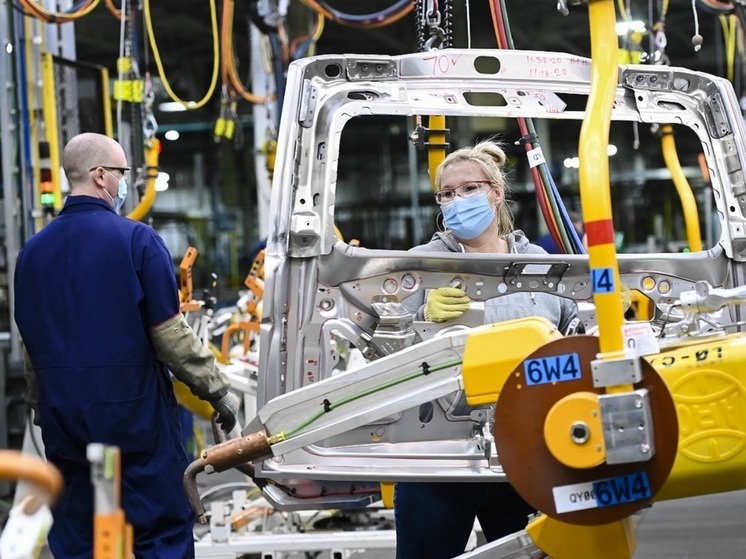Union negotiations with US auto giants have failed
Automotive industry workers staged a powerful strike after contract negotiations with American auto giants failed. The United Auto Workers Union failed to reach a deal with Ford, GM and Stellantis, which saw their profits and executive salaries soar.

The American auto industry is facing a series of strikes after the auto workers union failed to reach an agreement with three major manufacturers USA on a new contract, marking the beginning of the largest strike of industrial workers in recent decades.
According to The Guardian, the deadline for negotiations between Ford, General Motors, Stellantis and the United Auto Workers (UAW) passed at midnight on Thursday, with the parties still divided over the union's priorities for new contracts.
< The strike, which marks the first time all three Detroit automakers have gone on strike at the same time, is being coordinated by UAW President Sean Fein. He announced that he intends to launch a series of limited and targeted strikes to close select auto plants across the United States.
The strikes began at midnight at the General Motors plant in Wentzville, Missouri, the Stellantis plant in Toledo, Ohio, and the Ford Assembly plant in Wayne, Michigan.
At plants that are critical to the production of some of the The Detroit Three's most profitable vehicles, including the Ford Bronco, Jeep Wrangler and Chevrolet Colorado pickup, employ a total of 12,700 people.
«This is our defining moment,» Fein said during a livestream Thursday night, less than two hours before the strike began.
Sean Fein said he would join the picket at the Wayne plant when the strike will begin at midnight, and did not rule out expanding the strikes beyond the original three goals: “If we have to give it our all, we will do it.”
The UAW has an $825 million strike fund that is designed to compensate workers $500 a week during a strike and could support all its members for about three months. Taking strikes gradually, rather than all 150,000 members walking out at once, would allow the union to increase those resources.
A limited strike could also reduce the potential economic damage that economists and politicians fear would result from large-scale and long-term shutdown of three production facilities in Detroit, writes The Guardian.
According to Cox Automotive, Stellantis has more than 90 days' worth of Jeeps in stock and the plant is producing SUVs and trucks overtime.
But a week-long shutdown of Stellantis' Jeep plant in Toledo could cut revenue by more than $380 million. dollars, based on the company's financial statements.
«If negotiations don't go in a positive direction that Fein believes, we could very well expect a larger strike in a week or two,» said Sam Fiorani, production forecaster at Auto Forecast Solutions. It estimates the limited measures will halt production of about 24,000 cars a week.
The union's demands include a 40% wage increase, an end to tiers where some workers are paid at a lower rate than others, and restoring benefits from previous contracts, such as health benefits for retirees, better paid vacations and rights for workers affected by plant closures.
Workers cited past concessions and huge profits from the Big Three to argue their demands. Automaker profits jumped 92% from 2013 to 2022, totaling $250 billion. During the same time period, CEO pay increased by 40% and nearly $66 billion was paid out to shareholders in the form of stock dividends or stock buybacks.
The industry is also set to reap record taxpayer benefits for switching to electric vehicles .
Despite these financial performance, hourly wages for workers have fallen 19.3%, adjusted for inflation, since 2008.
The Biden administration is reportedly considering emergency aid to small firms that supply automakers due to the strike. and President Biden spoke with Fein about the progress of the negotiations on Thursday.
Ford said in a statement that the UAW's latest proposals would double U.S. labor costs. The layoffs could mean UAW profit-sharing checks for this year will be «voided,» the company said.
GM and Stellantis declined to comment ahead of the midnight strike deadline.
However, in an earlier video, GM Manufacturing Chief Executive Gerald Johnson said the UAW's wage and benefit proposals would cost the automaker $100 billion, «more than twice the cost of all of General Motors and absolutely impossible to absorb.» He did not specify how the union's proposals would result in such costs, or over what period of time.
And in an appearance on CNBC Thursday night, Ford CEO Jim Farley also criticized the union, saying: “We are not We will not be able to be sustainable as a company if they meet the union's wage demands.
GM CEO Mary Barra also said in a letter to employees about the progress of negotiations and the company's latest offer to the union: «Remember: we have there was a strike in 2019 and no one won”.
The fight for the contract received significant support from the public and the US labor movement. The drivers, represented by foremen, vowed not to cross the picket line, suspending vehicle deliveries from automakers throughout the strike. Several unions, environmental, racial and social justice groups have publicly announced support for the UAW in their fight for new contracts.


